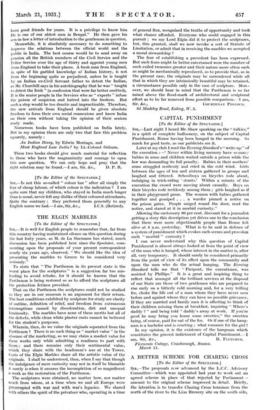CAPITAL PUNISHMENT
[To the Editor of the SPECTATOR.] SIR,—Last night I heard Mr. Shaw speaking on the " talkies," in a spirit of complete buffoonery, on the subject of Capital Punishment; Rouse having been hanged in the morning. So much for good taste, as our publicists see it.
Later at my club I read the Evening Standard's " write-up" of
the execution :—" Never within living memory have so many babies in arms and children waited outside a prison while the law was demanding its full penalty. Babies in their mothers' arms struggled restlessly and cried in the cold wind. Girls between the ages of ten and sixteen gathered in groups and laughed and tittered. Schoolboys on bicycles rode about, indulging in trick-riding ' stunts.' Within a minute of the execution the crowd were moving about casually. Boys on their bicycles rode recklessly among them ; girls laughed as if in their playground game. The women with babies gathered together and gossiped . . . a warder pinned a notice on the prison gates. People surged round the door, read the notice, and stared at it in morbid curiosity."
Allowing the customary 80 per cent. discount for a journalist
getting a story this description yet drives one to the conclusion that there were more objectionable people than Rouse left alive at 8 a.m. yesterday. What is to be said in defence of a system of punishment which evokes such scenes and provokes such " morbid " curiosity ?
I can never understand why this question of Capital
Punishment is almost always looked at from the point of view of the man who is hanged, whose interest in the matter is, after all, very temporary. It should surely be considered primarily from the point of view of its effect upon the community and upon the men who do the actual hanging. The Evening Standard tells me that " Pierpont, the executioner, was assisted by Phillips." It is a great and inspiring thing to reflect that amongst all the brilliant services at the disposal of our State are those of two gentlemen who are prepared to rise early on a bitterly cold morning and, for a very trifling fee, choke the life out of a man whom they have never seen before and against whom they can have no possible grievance. If they are married and family men it is affecting to think of their children missing them at breakfast, inquiring Where's daddy ? " and being told " daddy's away at work. If you're good he may bring you home some sweeties," the sweeties being, of course, paid for out of the fee. Or if one of the hang- men is a bachelor and is courting ; what romance for the girl I In my opinion, it is the existence of the hangman which constitutes the gravest indictment of Capital. Punishment. —I


















































 Previous page
Previous page